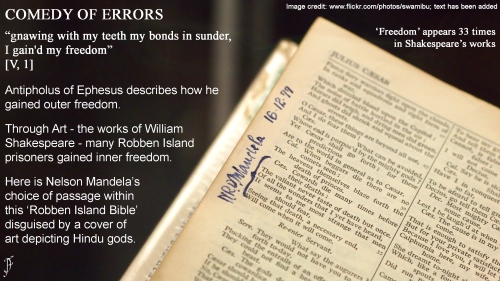
‘They that love best their loves shall not enjoy’
Below are heart-rending verses, likely to echo for any who did ever ‘suffer love’ and to provide fodder for those who wish to ‘speak ill’ of it.
I found them in Shakespeare’s narrative poem ‘Venus and Adonis’ while searching for a quote for today’s #ShakespeareSunday theme of Courage & Cowardice (chosen by @anne_obrien for creators @HollowCrownFans).
Venus, Goddess of Love, in mourning the death of Adonis, curses love:
‘Wonder of time,’ quoth she, ‘this is my spite,
That, thou being dead, the day should yet be light.
‘Since thou art dead, lo, here I prophesy:
Sorrow on love hereafter shall attend:
It shall be waited on with jealousy,
Find sweet beginning, but unsavoury end,
Ne’er settled equally, but high or low,
That all love’s pleasure shall not match his woe.
It shall be fickle, false and full of fraud,
Bud and be blasted in a breathing-while;
The bottom poison, and the top o’erstraw’d
With sweets that shall the truest sight beguile:
The strongest body shall it make most weak,
Strike the wise dumb and teach the fool to speak.
It shall be sparing and too full of riot,
Teaching decrepit age to tread the measures;
The staring ruffian shall it keep in quiet,
Pluck down the rich, enrich the poor with treasures;
It shall be raging-mad and silly-mild,
Make the young old, the old become a child.
It shall suspect where is no cause of fear;
It shall not fear where it should most mistrust;
It shall be merciful and too severe,
And most deceiving when it seems most just;
Perverse it shall be where it shows most toward,
Put fear to valour, courage to the coward.
It shall be cause of war and dire events,
And set dissension ‘twixt the son and sire;
Subject and servile to all discontents,
As dry combustious matter is to fire:
Sith in his prime Death doth my love destroy,
They that love best their loves shall not enjoy.’
*Shivers*
Notes on Playing
Note the wonderful use of sound, there to be played with when acting / reciting.
Perhaps, as I did, when looking at ‘fickle, false and full of fraud’, you might imagine another ‘f’-word feeling apt for the grieving and raging Venus!
Consider, too, changes, such as where she might be ranting and where quiet; where bitter, where despairing.
Explore the images created and sense them – what is it like to be ‘raging-mad’ and ‘silly-mild’? Tap into such rich description even as you speak these words.
‘The bottom poison, and the top o’erstraw’d / With sweets’ – what do you imagine, thinking about this?
Historically, floors could be covered with rushes and sweet-smelling herbs, the latter used to combat nasty odours. Useful to know, and I’d always advise looking up anything you are unsure of – this is a basic connection needed with the text: know what you are saying!
For your own personal connection, you can also use other images and ideas that spring from Shakespeare’s words, ones that come from your imagination responding to his.
While knowing of strewn rushes or straw as floor covering, I also found myself responding to ‘The bottom poison, and the top o’erstraw’d / With sweets’ by mentally creating a layered drink with sweet colourful juices above the initial poison, disguising it visibly and to the taste: a lethal cocktail with a couple of straws and one of those little umbrellas on top. Nice!
Yes, this is a different use of ‘straw’, but provided we know what was originally meant, and our version responds to that meaning, we can use different images and ideas to connect us with what we are saying.
Finding your own connections is a huge part of owning the words – written centuries ago, you can make these lines live now!





![Coriolanus [III, 3] Sicinius Velutus: What you have seen him do and heard him speak, Beating your officers, cursing yourselves, Opposing laws with strokes and here defying Those whose great power must try him; even this, So criminal and in such capital kind, Deserves the extremest death.](https://actingshakespeare.wordpress.com/wp-content/uploads/2017/06/power-defiance-survival-coriolanus-25th-june-2017-shakespeare-sunday1.jpg?w=500)


